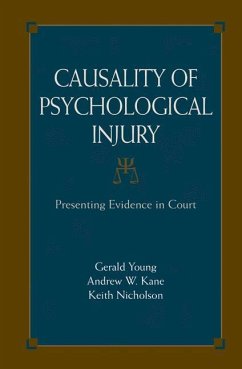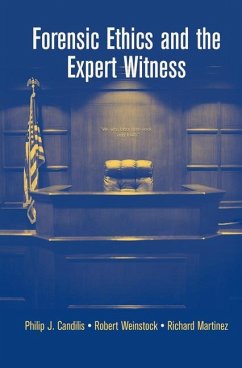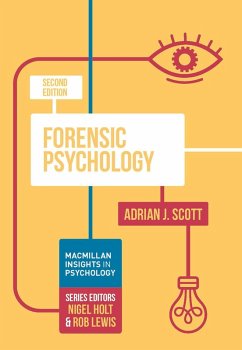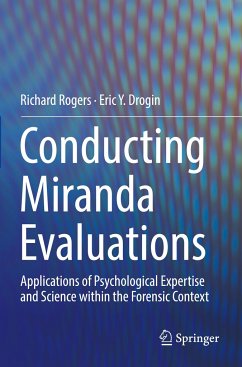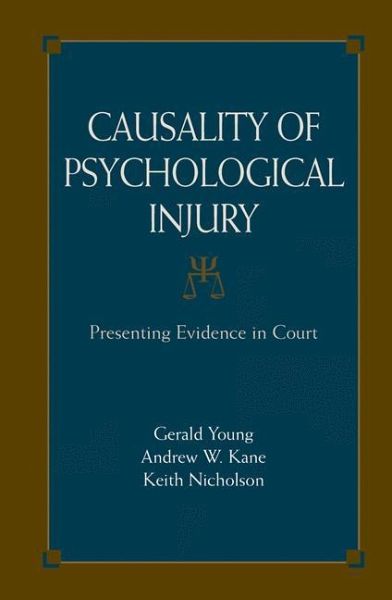
Causality of Psychological Injury
Presenting Evidence in Court
Mitarbeit: Shuman, Daniel
Versandkostenfrei!
Versandfertig in 6-10 Tagen
91,99 €
inkl. MwSt.
Weitere Ausgaben:

PAYBACK Punkte
46 °P sammeln!
This sequel to the authors' Psychological Knowledge in Court offers a welcome expansion on key concepts, terms, and issues in causality, bringing much needed clarity to psychological injury assessments and the legal contexts that employ them.Focusing on PTSD, traumatic brain injury, and chronic pain (and grounding readers in salient U.S. and Canadian case law), Causality sets out a multifactorial causality framework to facilitate admissibility of psychological evidence in court. Issues concerning malingering are examined in depth, as are clinical gray areas that can jeopardize validity. At the...
This sequel to the authors' Psychological Knowledge in Court offers a welcome expansion on key concepts, terms, and issues in causality, bringing much needed clarity to psychological injury assessments and the legal contexts that employ them.
Focusing on PTSD, traumatic brain injury, and chronic pain (and grounding readers in salient U.S. and Canadian case law), Causality sets out a multifactorial causality framework to facilitate admissibility of psychological evidence in court. Issues concerning malingering are examined in depth, as are clinical gray areas that can jeopardize validity. At the same time, the book clearly explains what lawyers and clinicians need to understand about each other's work-of crucial importance since the two sides often seem to speak at cross-purposes.
The authors and six guest contributors
Illustrate the roles of preexisting vulnerabilities, traumatic events, and post-event occurrences in psychological impairment and disability
Review the literature on PTSD, TBI, and chronic pain for legal relevance
Identify current challenges and controversies in the field, as well as emerging areas for research
Recommend methods and instruments for conducting more courtworthy assessments
Provide a detailed critical review of malingering and related phenomena
Propose a more accurate, shared terminology of causality
Valid causality judgments are based on sound knowledge of research on large populations and careful testing of individuals; at the same time they must conform to stringent legal standards of relevance and reliability to be accepted for testimony. Forensic practitioners and attorneys will turn to Causality of Psychological Injury as their professional paths increasingly cross in seeking comprehensive and state of the art information.
Focusing on PTSD, traumatic brain injury, and chronic pain (and grounding readers in salient U.S. and Canadian case law), Causality sets out a multifactorial causality framework to facilitate admissibility of psychological evidence in court. Issues concerning malingering are examined in depth, as are clinical gray areas that can jeopardize validity. At the same time, the book clearly explains what lawyers and clinicians need to understand about each other's work-of crucial importance since the two sides often seem to speak at cross-purposes.
The authors and six guest contributors
Illustrate the roles of preexisting vulnerabilities, traumatic events, and post-event occurrences in psychological impairment and disability
Review the literature on PTSD, TBI, and chronic pain for legal relevance
Identify current challenges and controversies in the field, as well as emerging areas for research
Recommend methods and instruments for conducting more courtworthy assessments
Provide a detailed critical review of malingering and related phenomena
Propose a more accurate, shared terminology of causality
Valid causality judgments are based on sound knowledge of research on large populations and careful testing of individuals; at the same time they must conform to stringent legal standards of relevance and reliability to be accepted for testimony. Forensic practitioners and attorneys will turn to Causality of Psychological Injury as their professional paths increasingly cross in seeking comprehensive and state of the art information.



